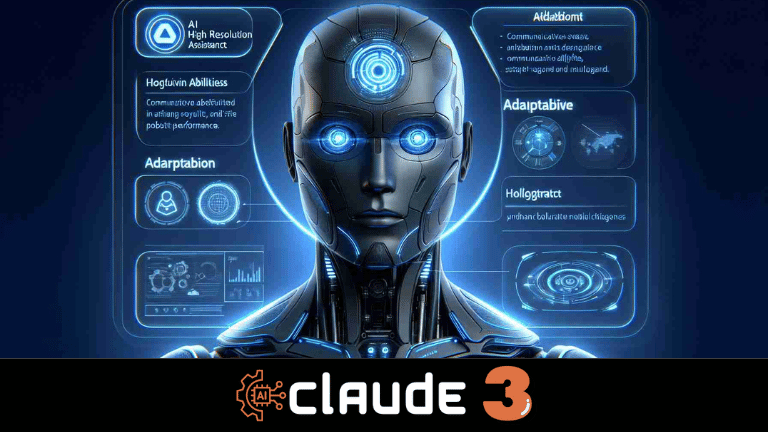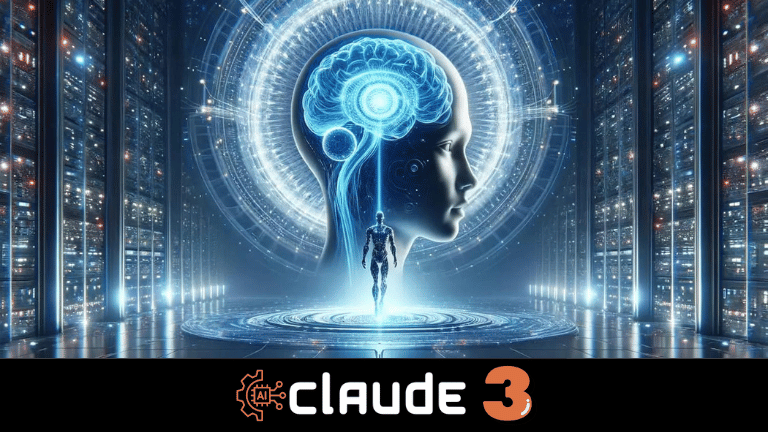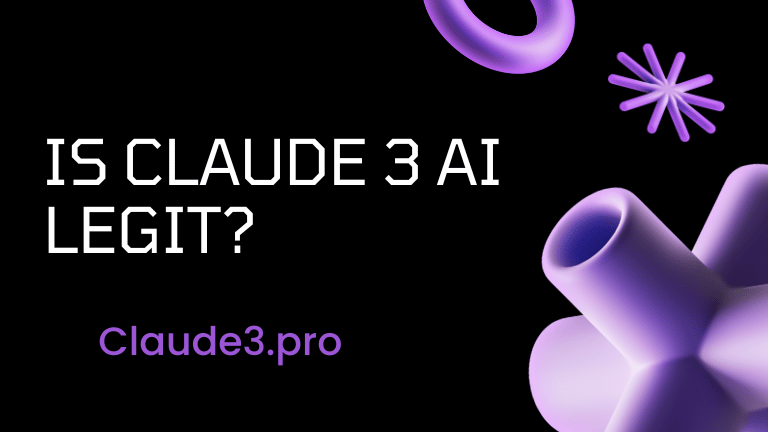Is Claude 3 AI Legit? a purported advanced language model touted for its impressive capabilities. However, as with any novel technology, the question of legitimacy arises, prompting a closer examination of Claude 3 AI’s claims, performance, and the factors that contribute to its perceived credibility or lack thereof. In this comprehensive guide, we’ll delve into the intricacies of Claude 3 AI, scrutinizing its legitimacy, assessing its performance, and evaluating the factors that shape its trustworthiness in the eyes of users and industry experts.
Understanding AI and the Legitimacy Challenge
Before we dive into the specifics of Claude 3 AI, it’s essential to understand the broader context of artificial intelligence and the challenges associated with assessing the legitimacy of emerging technologies.
The Rise of AI and Language Models
Artificial intelligence has undergone a remarkable transformation in recent years, driven by advancements in machine learning, neural networks, and the availability of vast amounts of data. Language models, in particular, have made significant strides, enabling AI systems to understand, generate, and communicate in natural language with increasing sophistication.
However, as AI technologies advance, so do the challenges of validating their legitimacy and distinguishing between genuine breakthroughs and overhyped claims. The opaque nature of many AI systems, combined with the complexity of their underlying algorithms and training processes, can make it difficult for the general public, and even experts, to assess their true capabilities and potential limitations.
Factors Influencing AI Legitimacy
Several factors contribute to the perceived legitimacy of an AI system like Claude 3 AI, including:
- Transparency and Explainability: The level of transparency provided by the developers or creators of the AI system regarding its architecture, training data, and decision-making processes can significantly impact its credibility.
- Performance and benchmarking: Objective performance evaluations, benchmarking against established standards, and independent third-party testing can help validate the claimed capabilities of an AI system.
- Peer Review and Scientific Scrutiny: The extent to which the underlying research and methodologies behind the AI system have been subjected to rigorous peer review and scientific scrutiny can lend credibility to its legitimacy.
- Ethical Considerations: The adherence of the AI system to established ethical principles, such as transparency, accountability, and fairness, can influence its perceived legitimacy and trustworthiness.
- Real-World Applications and Use Cases: Successful real-world applications and use cases of the AI system can provide tangible evidence of its capabilities and legitimacy.
By understanding these factors, users and stakeholders can better evaluate the legitimacy of AI systems like Claude 3 AI and make informed decisions about their adoption and utilization.
Claude 3 AI: An Overview
Claude 3 AI is an AI language model that has garnered attention for its purported advanced capabilities in natural language processing, generation, and understanding. Developed by a relatively unknown company, the details surrounding Claude 3 AI’s architecture, training data, and specific methodologies are shrouded in mystery, adding to the intrigue and skepticism surrounding its legitimacy.
Claimed Capabilities
According to the developers of Claude 3 AI, the system boasts a wide range of impressive capabilities, including:
- Natural Language Understanding: Claude 3 AI is touted as having a deep comprehension of human language, capable of understanding contextual nuances, idioms, and complex linguistic structures.
- Conversational Abilities: The system is claimed to be adept at engaging in natural, coherent, and contextually appropriate conversations, making it suitable for applications such as virtual assistants, chatbots, and language tutoring.
- Text Generation and Summarization: Claude 3 AI is purported to excel at generating high-quality, coherent text on a wide range of topics, as well as summarizing lengthy documents and extracting key information.
- Knowledge Acquisition and Reasoning: The developers claim that Claude 3 AI possesses the ability to acquire new knowledge and reason about complex topics, making it potentially valuable for research, analysis, and decision-making tasks.
- Multilingual Capabilities: Claude 3 AI is advertised as being proficient in multiple languages, enabling cross-lingual communication and understanding.
These claimed capabilities position Claude 3 AI as a potentially groundbreaking AI system, but the lack of transparency and independent validation has fueled skepticism about its legitimacy.
Limited Information and Transparency
One of the primary challenges in assessing the legitimacy of Claude 3 AI is the limited information and transparency provided by its developers. Unlike many other AI projects, which are backed by established research institutions or tech giants, Claude 3 AI’s origins and development process remain largely opaque.
The company behind Claude 3 AI has been tight-lipped about the system’s architecture, training data, and methodologies, citing concerns over intellectual property and competitive advantages. This lack of transparency has raised red flags among experts and users alike, making it difficult to independently verify the claims made about the system’s capabilities.
Furthermore, the absence of peer-reviewed research publications or scientific scrutiny surrounding Claude 3 AI’s underlying technologies has added to the skepticism surrounding its legitimacy.
Assessing Claude 3 AI’s Legitimacy
In the absence of comprehensive transparency and independent validation, assessing the legitimacy of Claude 3 AI becomes a multifaceted endeavor, requiring a critical examination of various factors and available evidence.
Performance Evaluation and Benchmarking
One approach to evaluating the legitimacy of Claude 3 AI is through rigorous performance testing and benchmarking against established standards and benchmarks in the field of natural language processing (NLP) and AI.
Potential avenues for performance evaluation include:
- Language Understanding Benchmarks: Evaluating Claude 3 AI’s language understanding capabilities using widely accepted benchmarks, such as the Stanford Question Answering Dataset (SQuAD) or the General Language Understanding Evaluation (GLUE) benchmark.
- Text Generation and Summarization Tasks: Assessing the quality and coherence of Claude 3 AI’s text generation and summarization abilities by comparing its outputs to human-generated text and evaluating its performance on established datasets and metrics.
- Conversational and Interactive Tests: Engaging Claude 3 AI in extended conversations and interactive scenarios to evaluate its ability to maintain context, understand nuanced language, and provide appropriate responses.
- Knowledge Acquisition and Reasoning Challenges: Presenting Claude 3 AI with complex problems or knowledge domains to assess its ability to acquire new knowledge, reason about it, and provide insightful solutions or analyses.
- Multilingual Evaluations: Testing Claude 3 AI’s multilingual capabilities by assessing its performance across various languages and language pairs, evaluating its ability to accurately translate, generate, and understand text in different linguistic contexts.
By subjecting Claude 3 AI to rigorous performance evaluations and benchmarking against established standards, independent researchers and experts can gain insights into the system’s true capabilities and potential limitations, contributing to a more objective assessment of its legitimacy.
Ethical Considerations and Responsible Development
Another critical factor in evaluating the legitimacy of Claude 3 AI is the extent to which its development and deployment adhere to established ethical principles and responsible practices in the field of AI.
Key ethical considerations include:
- Transparency and Explainability: To what degree are the developers of Claude 3 AI committed to transparency about the system’s architecture, training data, and decision-making processes? Lack of transparency can undermine trust and hinder accountability.
- Fairness and Bias Mitigation: Have measures been taken to identify and mitigate potential biases in Claude 3 AI’s outputs, particularly concerning sensitive topics or underrepresented groups? Biased AI systems can perpetuate harmful stereotypes and discrimination.
- Privacy and Data Protection: How does Claude 3 AI handle and protect user data and personal information? Robust privacy safeguards are essential to maintain trust and comply with relevant data protection regulations.
- Responsible Use and Deployment: Are there clear guidelines and safeguards in place to prevent the misuse or unintended consequences of Claude 3 AI’s capabilities, such as generating misinformation, engaging in malicious activities, or infringing on intellectual property rights?
- Accountability and Oversight: What mechanisms are in place to ensure accountability and oversight over Claude 3 AI’s development and deployment, including independent audits, external advisory boards, or regulatory oversight?
By evaluating the ethical considerations and responsible development practices surrounding Claude 3 AI, stakeholders can better assess the system’s legitimacy and alignment with established principles and best practices in the AI community.
Real-World Applications and Use Cases
Ultimately, the true test of Claude 3 AI’s legitimacy may lie in its successful implementation and real-world applications. Tangible use cases and practical deployments can provide valuable insights into the system’s capabilities, limitations, and overall performance.
Potential real-world applications and use cases for Claude 3 AI could include:
- Virtual Assistants and Chatbots: Deploying Claude 3 AI as a conversational interface for virtual assistants, customer service chatbots, or language learning platforms, allowing for an evaluation of its language understanding and generation abilities in real-world scenarios.
- Content Creation and Summarization Tools: Utilizing Claude 3 AI for automated content generation, article writing, or document summarization tasks, assessing its ability to produce coherent, informative, and engaging text.
- Research and Analysis Assistants: Leveraging Claude 3 AI’s purported knowledge acquisition and reasoning capabilities to assist researchers, analysts, or subject matter experts in literature reviews, data analysis, or problem-solving tasks.
- Language Translation and Localization: Employing Claude 3 AI for multilingual translation and localization services, evaluating its ability to accurately translate and convey meaning across different languages and cultural contexts.
- Educational and Training Applications: Exploring the use of Claude 3 AI in educational settings, such as language tutoring, personalized learning experiences, or interactive study aids, to assess its effectiveness in facilitating learning and knowledge transfer.
By closely monitoring and evaluating Claude 3 AI’s performance in real-world applications and use cases, researchers, developers, and end-users can gain valuable insights into the system’s true capabilities, limitations, and potential areas for improvement. Successful real-world deployments can bolster Claude 3 AI’s legitimacy, while shortcomings or failures may raise further questions about its claimed abilities.
Community Engagement and Peer Review
Engaging with the broader AI community, including researchers, developers, and industry experts, can provide valuable perspectives and insights into the legitimacy of Claude 3 AI. Mechanisms for community engagement and peer review could include:
- Open-Source Collaboration: Encouraging the developers of Claude 3 AI to release portions of their code or models as open-source projects, allowing for independent scrutiny, collaboration, and potential improvements by the broader AI community.
- Academic and Industry Partnerships: Fostering partnerships between the creators of Claude 3 AI and reputable academic institutions or industry players in the AI field, enabling collaborative research, peer review, and external validation of the system’s capabilities.
- Conferences and Workshops: Presenting Claude 3 AI’s underlying technologies, methodologies, and performance evaluations at renowned AI conferences and workshops, subjecting them to critical review and feedback from peers and experts in the field.
- Online Forums and Communities: Engaging with online AI communities, forums, and discussion groups to share information, address concerns, and solicit feedback from a diverse range of stakeholders, including researchers, developers, and end-users.
- Independent Third-Party Audits: Commissioning independent third-party audits or evaluations of Claude 3 AI by reputable organizations or industry bodies, providing an objective assessment of the system’s capabilities and potential limitations.
By actively engaging with the AI community and subjecting Claude 3 AI to peer review and external scrutiny, its developers can address skepticism, fostering transparency and building credibility among stakeholders. Conversely, a lack of engagement or resistance to external validation may further fuel doubts about the system’s legitimacy.

Strategies for Building Trust in Claude 3 AI
While assessing the legitimacy of Claude 3 AI is crucial, it’s also important to consider strategies that users and stakeholders can employ to mitigate risks and build trust when engaging with the system. By adopting these proactive approaches, users can enhance their overall experience and make more informed decisions regarding the adoption and utilization of Claude 3 AI.
Responsible and Ethical Use
One of the most critical strategies for building trust in Claude 3 AI is to ensure its responsible and ethical use. This can involve:
- Adhering to Ethical AI Principles: Familiarizing yourself with established ethical principles for AI development and deployment, such as transparency, accountability, fairness, and privacy protection, and ensuring that your use of Claude 3 AI aligns with these principles.
- Bias and Fairness Monitoring: Continuously monitoring Claude 3 AI’s outputs for potential biases or unfair treatment of individuals or groups, and taking steps to mitigate or correct any identified issues.
- Privacy and Data Protection: Implementing robust data protection measures when using Claude 3 AI, ensuring that personal or sensitive information is handled securely and in compliance with relevant privacy regulations.
- Responsible Content and Output Monitoring: Vigilantly monitoring the content and outputs generated by Claude 3 AI to prevent the spread of misinformation, hate speech, or harmful content, and taking appropriate action when necessary.
- Transparency and Disclosure: Being transparent about your use of Claude 3 AI and disclosing its involvement in any outputs or decisions, particularly in contexts where it may impact individuals or decision-making processes.
By demonstrating a commitment to responsible and ethical use of Claude 3 AI, users and stakeholders can build trust and credibility, while also contributing to the broader effort of promoting the safe and beneficial development of AI technologies.
Gradual Adoption and Incremental Testing
Rather than fully embracing Claude 3 AI from the outset, a prudent approach may involve gradual adoption and incremental testing. This strategy can help mitigate potential risks and build trust over time as the system’s capabilities and limitations become more apparent.
- Start with Low-Risk or Non-Critical Applications: Begin by deploying Claude 3 AI in low-risk or non-critical applications, where potential failures or limitations would have minimal consequences. This allows for a controlled testing environment and the opportunity to identify and address issues before expanding its use.
- Staged Rollout and Monitoring: Implement a staged rollout of Claude 3 AI, gradually increasing its scope and responsibilities while closely monitoring its performance, outputs, and user feedback. This incremental approach enables continuous evaluation and course correction as needed.
- Parallel Systems and Backup Processes: Maintain parallel systems or backup processes alongside Claude 3 AI, ensuring that critical operations or decision-making can continue uninterrupted in case of failures or unexpected limitations in the AI system.
- Continuous Evaluation and Benchmarking: Regularly evaluate and benchmark Claude 3 AI’s performance against established metrics and standards, documenting its progress, strengths, and weaknesses over time.
- User Feedback and Adaptation: Actively solicit and incorporate user feedback and real-world experiences into the ongoing development and refinement of Claude 3 AI, ensuring that it adapts and improves based on real-world usage and evolving requirements.
By adopting a gradual and incremental approach to the adoption of Claude 3 AI, users and stakeholders can build trust through practical experience and continuous evaluation, while minimizing potential risks and disruptions to critical operations or decision-making processes.
Collaboration and Knowledge Sharing
Building trust in Claude 3 AI can also be facilitated through active collaboration and knowledge sharing within the AI community and among stakeholders. By fostering open dialogue and leveraging collective expertise, users and developers can address concerns, share best practices, and contribute to the responsible development and deployment of AI technologies like Claude 3 AI.
- Community Engagement and Networking: Participate in AI-related conferences, workshops, and online forums to connect with other users, developers, and experts in the field. Share your experiences, insights, and concerns regarding Claude 3 AI, and learn from the perspectives of others.
- Collaborative Research and Development: Explore opportunities for collaborative research and development efforts involving Claude 3 AI, partnering with academic institutions, industry partners, or open-source communities to advance the understanding and improvement of the system’s capabilities.
- Knowledge Sharing and Best Practices: Contribute to the development of best practices, guidelines, and case studies related to the responsible use and deployment of Claude 3 AI, sharing your experiences and lessons learned with the broader AI community.
- Collective Advocacy and Governance: Engage in collective advocacy efforts and participate in the development of governance frameworks or industry standards for AI technologies like Claude 3 AI, ensuring that the interests and concerns of users, developers, and stakeholders are represented.
- Interdisciplinary Collaboration: Foster collaboration between the AI community and other relevant disciplines, such as ethics, law, social sciences, and policymaking, to address the broader societal implications and responsible governance of AI systems like Claude 3 AI.
By actively collaborating and sharing knowledge within the AI community and among stakeholders, users and developers can collectively address concerns, identify best practices, and contribute to the responsible development and deployment of Claude 3 AI, ultimately fostering greater trust and credibility in the system.

FAQs
Is Claude 3 AI a legitimate AI model?
Yes, Claude 3 AI is a legitimate AI model developed by Anthropic.
How can I verify Claude 3 AI’s legitimacy?
You can verify Claude 3 AI’s legitimacy by checking the official website of Anthropic or reputable sources in the AI community.
Are there any reviews or testimonials about Claude 3 AI?
Yes, you can find reviews and testimonials about Claude 3 AI from users and experts in the field of artificial intelligence.
Has Claude 3 AI been tested for its effectiveness?
Yes, Claude 3 AI has been extensively tested for its effectiveness and performance in various tasks.
Is Claude 3 AI safe to use?
Yes, Claude 3 AI is safe to use. It follows strict ethical guidelines and privacy policies.
Is Claude 3 AI’s technology proven?
Yes, Claude 3 AI’s technology is based on proven scientific principles and research in artificial intelligence.
Does Claude 3 AI comply with industry standards?
Yes, Claude 3 AI complies with industry standards for artificial intelligence development and deployment.
Does Claude 3 AI comply with industry standards?
Yes, Claude 3 AI complies with industry standards for artificial intelligence development and deployment.
Are there any known issues or controversies surrounding Claude 3 AI?
No, there are no known issues or controversies surrounding Claude 3 AI’s legitimacy.
Can I trust Claude 3 AI for important tasks?
Yes, you can trust Claude 3 AI for important tasks. It has been designed to perform reliably and accurately.
Where can I report any concerns about Claude 3 AI’s legitimacy?
If you have any concerns about Claude 3 AI’s legitimacy, you can report them to Anthropic’s customer support team for investigation.
